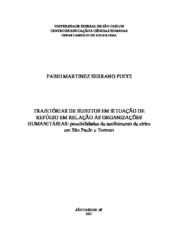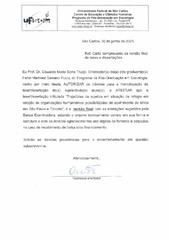| dc.contributor.author | Pucci, Fabio Martinez Serrano | |
| dc.date.accessioned | 2021-07-03T11:41:59Z | |
| dc.date.available | 2021-07-03T11:41:59Z | |
| dc.date.issued | 2021-05-07 | |
| dc.identifier.citation | PUCCI, Fabio Martinez Serrano. Trajetórias de sujeitos em situação de refúgio em relação às organizações humanitárias: possibilidades de acolhimento de sírios em São Paulo e Toronto. 2021. Tese (Doutorado em Sociologia) – Universidade Federal de São Carlos, São Carlos, 2021. Disponível em: https://repositorio.ufscar.br/handle/ufscar/14501. | * |
| dc.identifier.uri | https://repositorio.ufscar.br/handle/ufscar/14501 | |
| dc.description.abstract | The objective of this dissertation is to relate Syrian refugees’ trajectories to the settlement infrastructure of humanitarian organizations – governmental, from the civil society and the Arab diaspora. I contend that the fragmentation and ambiguity of specific policies towards refugees in Brazil lead them to seek settlement in religious organizations linked to the Arabs. I also examine the extent to which Syrian newcomers established lasting social connections with the Arabs in Brazil. Finally, I carried out a comparative study case on Syrian refugees in Toronto, Canada, where there is a Private Sponsorship Program in which Canadian citizens and permanent residents voluntarily commit themselves to resettling refugees for one year. I adopted the following theoretical framework: Bourdieu (social capital), Glick-Schiller et al. (modes of incorporation at the individual level), Portes and Rumbaut (modes of incorporation at the organizational level), Brubaker and Cooper (identification), Simmel (religion and religiosity), Agier, Fassin and Barnett (humanitarianism). I adopted qualitative methods, which consist of interviews with Syrians in a refugee situation, Arabs and professionals who work in humanitarian organizations. The data analysis and codification are based on the constructive approach of Grounded Theory. The main finding is that Syrians in a refugee situation and the Arabs established fragile bonds. This is due to the weak levels of identification in both national origin and religious affiliation between the two groups. However, there are strong levels of both class and professional identification. Religious transnational networks facilitated the access of some subjects in a refugee situation to the settlement infrastructure of churches and mosques. Religiosity and social connections with sheikhs and priests were determinant in those trajectories. However, the better possibilities of settlement were found in the organizations not linked to the Arabs. Finally, some Syrians avoided obtaining help from humanitarian organizations, rejecting the “refugees” label and asserting their ability to make their own decisions. | eng |
| dc.description.sponsorship | Fundação de Amparo à Pesquisa do Estado de São Paulo (FAPESP) | por |
| dc.language.iso | por | por |
| dc.publisher | Universidade Federal de São Carlos | por |
| dc.rights | Attribution-NonCommercial-NoDerivs 3.0 Brazil | * |
| dc.rights.uri | http://creativecommons.org/licenses/by-nc-nd/3.0/br/ | * |
| dc.subject | Deslocamentos forçados | por |
| dc.subject | Organizações humanitárias | por |
| dc.subject | Modos de incorporação | por |
| dc.subject | Religiosidade | por |
| dc.subject | Árabes | por |
| dc.subject | Forced displacement | eng |
| dc.subject | Humanitarian organizations | eng |
| dc.subject | Modes of incorporation | eng |
| dc.subject | Religiosity | eng |
| dc.subject | Arabs | eng |
| dc.title | Trajetórias de sujeitos em situação de refúgio em relação às organizações humanitárias: possibilidades de acolhimento de sírios em São Paulo e Toronto | por |
| dc.title.alternative | Trajectories of subjects in a refugee situation related to humanitarian organizations: possibilities of Syrians’ settlement in São Paulo and Toronto | eng |
| dc.type | Tese | por |
| dc.contributor.advisor1 | Truzzi, Oswaldo Mário Serra | |
| dc.contributor.advisor1Lattes | http://lattes.cnpq.br/5005536921435787 | por |
| dc.description.resumo | Esta tese tem como objetivo relacionar as trajetórias de sírios em situação de refúgio com as estruturas de acolhimento de organizações humanitárias – governamentais, da sociedade civil e da diáspora árabe. Adota-se a hipótese de que a fragmentação e ambiguidade das políticas públicas para refugiados no Brasil os levaram a buscar acolhimento em organizações religiosas ligadas aos árabes. Examina-se, ainda, até que ponto os sírios recém-chegados estabeleceram vínculos duradouros com os árabes no Brasil. Por fim, lança-se mão de um estudo de caso sobre os sírios em situação de refúgio em Toronto, no Canadá, onde há um programa de patrocínio privado no qual cidadãos canadenses ou residentes permanentes voluntariamente se comprometem a reassentar os refugiados por um ano. Utilizam-se os seguintes referenciais teóricos: Bourdieu (capital social), Glick Schiller et al. (modos de incorporação ao nível do sujeito), Portes e Rumbaut (modos de incorporação a nível das organizações), Brubaker e Cooper (identificação), Simmel (religião e religiosidade), Agier, Fassin e Barnett (humanitarismo). Utiliza-se o método qualitativo, o qual consiste em entrevistas semiestruturadas com sírios em situação de refúgio, árabes e profissionais de organizações humanitárias. Para a codificação e análise dos dados utiliza-se a abordagem construtivista da Grounded Theory. Conclui-se que há uma fragilidade nos vínculos estabelecidos pelos sírios em situação de refúgio com os árabes. Isso se deve a um baixo nível de identificação de origem nacional e religiosa entre os dois grupos. Por outro lado, há forte identificação de classe e profissional. As redes religiosas transnacionais favorecem o acesso de alguns sujeitos em situação de refúgio às estruturas de acolhimento das igrejas e mesquitas. A religiosidade e as relações com o sheik e/ou os párocos são determinantes nessas trajetórias. No entanto, as maiores possibilidades de acolhimento se encontram nas organizações não ligadas aos árabes. Por fim, há um grupo de sujeitos que evitam se relacionar com as organizações humanitárias, rejeitando o rótulo de “refugiados” e afirmando sua capacidade de tomar as próprias decisões. | por |
| dc.publisher.initials | UFSCar | por |
| dc.publisher.program | Programa de Pós-Graduação em Sociologia - PPGS | por |
| dc.subject.cnpq | CIENCIAS HUMANAS::SOCIOLOGIA::OUTRAS SOCIOLOGIAS ESPECIFICAS | por |
| dc.description.sponsorshipId | FAPESP: 2016/19485-2 | por |
| dc.description.sponsorshipId | FAPESP: 2018/20996-7 | por |
| dc.publisher.address | Câmpus São Carlos | por |
| dc.contributor.authorlattes | http://lattes.cnpq.br/0830221445294684 | por |


